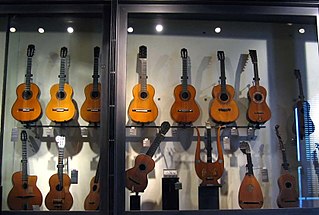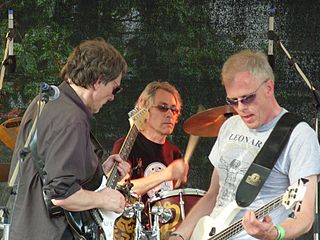
The guitar is a fretted musical instrument that typically has six strings. It is held flat against the player's body and played by strumming or plucking the strings with the dominant hand, while simultaneously pressing selected strings against frets with the fingers of the opposite hand. A plectrum or individual finger picks may be used to strike the strings. The sound of the guitar is projected either acoustically, by means of a resonant chamber on the instrument, or amplified by an electronic pickup and an amplifier.

Stefan Wolpe was a German composer. He escaped to Vienna separating from his wife and daughter. He married in Vienna in 1927 and again in 1934. Wolpe went to Palestine and moved in 1938 to the United States where he married for a third time.

Steinberger is a series of distinctive electric guitars and bass guitars, designed and originally manufactured by Ned Steinberger. The name "Steinberger" can be used to refer to either the instruments themselves or the company that originally produced them. Although the name has been applied to a variety of instruments, it is primarily associated with a minimalist "headless" design of electric basses and guitars.

Carlo Marchione is a classical guitarist from Italy and was born in Rome, Italy in 1964. He teaches at the Maastricht Academy of Music (Netherland), leading one of the most appreciated guitar classes of Europe.

Paul Dessau was a German composer and conductor. He collaborated with Bertolt Brecht and composed incidental music for his plays, and several operas based on them.
Harald Genzmer was a German composer of classical music and an academic.

Tierkreis (1974–75) is a musical composition by the German composer Karlheinz Stockhausen. The title is the German word for Zodiac, and the composition consists of twelve melodies, each representing one sign of the zodiac.
Friedrich Blume was professor of musicology at the University of Kiel from 1938–1958. He was a student in Munich, Berlin and Leipzig, and taught in the last two of these for some years before being called to the chair in Kiel. His early studies were on Lutheran church music, including several books on J.S. Bach, but broadened his interests considerably later. Among his prominent works were chief editor of the collected Praetorius edition, and he also edited the important Eulenburg scores of the major Mozart Piano Concertos. From 1949 he was involved in the planning and writing of Die Musik in Geschichte und Gegenwart. Coincidentally he died within a few weeks of another prominent Mozart musicologist, Cuthbert Girdlestone, and was thus almost his exact contemporary.

The following is a bibliography of classical guitar related publications.
Beat Furrer is a Swiss-born Austrian composer and conductor. He has served as professor of composition at the University of Music and Performing Arts Graz since 1991. He was awarded the Ernst von Siemens Music Prize in 2018.

Hellmut Hattler is a German jazz and rock bassist and composer. Hattler took much of his early influences from Jimi Hendrix. As a child, he received violin lessons, and in the 1960s, he played guitar. Joining Peter Wolbrandt's band marked the debut of his changeover to the bass. In May 1971, he founded the pop group Kraan with the Wolbrandt brothers Peter and Jan and Johannes Pappert. Kraan's early Krautrock style later developed towards fusion, combining rock, jazz and ethnic elements. Apart from his own projects, Hattler has toured and recorded with many international musicians of various genres including Tina Turner, Billy Cobham, Joachim Kühn, Torsten de Winkel, Alphonse Mouzon, and Nippy Noya.
The "Wiener Klangstil" is the particular way in which Viennese and – to an extent – Austrian orchestras interpret orchestral and chamber works, preferring a performance style and tonal qualities markedly different from international practice. This term to describe the characteristics of the Viennese style of playing was first defined by Gregor Widholm in 2006 in the Österreichisches Musiklexikon, vol. 5.

Carl Wilhelm August Blum was a German singer, librettist, stage actor, director, guitarist and opera and song composer. Philip J. Bone wrote that Blum was "a universal genius, uniting in one person the poet, the dramatist, composer, singer and performer." He was composer to the Court of the King of Prussia.
Wilhelm Ehmann was a German musicologist, editor, church musician and conductor. He founded the choir Westfälische Kantorei that toured internationally and made many recordings. He was a cofounder and director of the later Hochschule für Kirchenmusik Herford.
Roger Rossmeisl was a German luthier who designed electric guitars in the 1950s and '60s for the US companies Rickenbacker and Fender.

Konrad Wölki was a German composer, mandolinist and music educator who contributed to the musically critical appreciation of the Zupforchesters. Historian Paul Sparks labeled Wölki "the founding father of modern German plucked-string music."
Rolf Riehm is a German composer who wrote stage and orchestral works as well as music for ensembles and solo instruments. He began as an oboist and music teacher and was later a professor of music theory at the Hochschule für Musik und Darstellende Kunst Frankfurt am Main for several years.
Rudolf Gerber was a German musicologist. He was professor and director of the musicology department of the University of Gießen and from 1943 professor of musicology at the University of Göttingen.

Friedrich Schenker was a German avant-garde composer and trombone player.
Walter Draeger was a German composer and music educator. Er war Professor an der Staatliche Hochschule für Theater und Musik Halle and the Hochschule für Musik Franz Liszt, Weimar. In 1955, war er Mitinitiator der ersten Hallische Musiktage.










